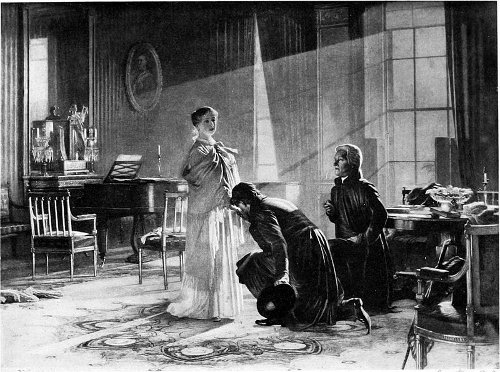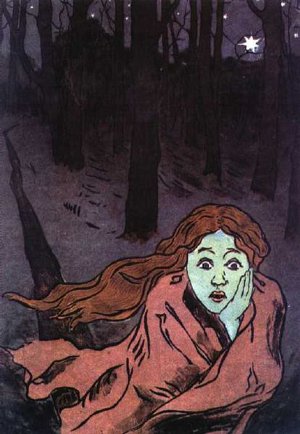“I am fond of the businessman’s paradox due to Lisa Collier: The president of a certain company offered a reward of $100 to any employee who could offer a suggestion which would save the company money. One employee suggested: ‘Eliminate the reward.'” — Raymond Smullyan
The Lip-Reader’s Bane

I can’t vouch for this — from I.J. Reeve, The Wild Garland (1865), “a Welsh englyn which in its four lines does not contain a single consonant”:
“On the Silkworm”
O’i wiw wy i weu ê â a’i weau
O’i wyau e weua;
E’ weua ei we aia’.
Ai weau yw ieuau iâ.
Translation:
“I perish by my art; dig my own grave;
I spin my thread of life; my death I weave.”
On the Job

A revealing detail from the life of the 18-year-old Queen Victoria, newly crowned in 1837:
At twelve o’clock she presided at a Council, ‘with as much ease as if she had been doing nothing else all her life’; after which she received the archbishops and bishops, to whom she said nothing, but showed an extreme dignity and gracefulness of manner. This ceremony finished and the duties of the day at an end, she retired with slow stateliness; but forgetful that the door through which she passed had glass panels that allowed her retreat to be seen, she had no sooner quitted the council chamber than she scampered light-heartedly away, like a child released from school.
From Joseph Fitzgerald Molloy’s The Sailor King: William the Fourth, His Court and His Subjects, 1903
Table Talk
At a tavern one night,
Messrs. Moore, Strange, and Wright
Met to drink and their good thoughts exchange;
Says Moore, “Of us three,
Everyone will agree,
There’s only one knave, and that’s Strange.”
Says Strange, rather sore,
“I’m sure there’s one Moore,
A most terrible knave, and a fright,
Who cheated his mother,
His sister and brother–”
“Oh, yes,” replied Moore, “that is Wright.”
— Anonymous
Partisan Epitaphs
Through this inscription I wish to enter my dying protest against what is called the Democratic Party. I have watched it closely since the days of Jackson and know that all the misfortunes of our Nation have come to it through the so called party. Therefore beware of this party of treason.
— N. Grigsby (1812-1890), Attica, Kan.
He believed that nothing but the success of the Democratic Party would ever save this Union.
— Elisha Bowman (1832-1865), Pekin, Ind.
The Family of Robert T. Hallenbeck
None of us ever voted for
Roosevelt or Truman
— Elgin, Minn.
Kind friends I’ve
Left behind
Cast your vote for
Jennings Bryan.
— B.H. Norris (1849-1900), Montgomery City, Mo.
Sacred to the memory of Henry Devine
a native of Ireland,
who died in Port Gibson
November 7th, 1844. Aged 32 years.
During the protracted illness which preceded
his death the deceased often expressed a wish
only to live long enough to vote for Henry
Clay for the Presidency. His wish was granted.
The last act of his life was to vote the Whig
ticket having done which he declared that he
died satisfied.
— Wintergreen Cemetery, Port Gibson, Miss.
Unquote

“We are terrified by the idea of being terrified.” — Nietzsche
“Present fears are less than horrible imaginings.” — Shakespeare
“Fear of danger is ten thousand times more terrifying than danger itself.” — Defoe
School Reform

A classroom contains 25 desks arranged in 5 rows and 5 columns. The teacher asks each student to move to the desk in front of, behind, to the left of, or to the right of her current desk. The students at the edges have limited choices — will every child be able to find a new seat?
Checking In
Letter from T.S. Eliot to Leonard and Virginia Woolf, Feb. 3, 1940:
Possum now wishes to explain his silence
And to apologise (as only right is);
He had an attack of poisoning of some violence,
Followed presently by some days in bed with laryngitis.
Yesterday he had to get up and dress–
His voice very thick and his head feeling tetrahedral,
To go and meet the Lord Mayor & Lady Mayoress
At a meeting which had something to do with repairs to Southwark Cathedral.
His legs are not yet ready for much strain & stress
And his words continue to come thick and soupy all:
These are afflictions tending to depress
Even the most ebullient marsupial.
But he would like to come to tea
One day next week (not a Wednesday)
If that can be arranged
And to finish off this letter
Hopes that you are no worse and that Leonard is much better.
Errata
In the early 1960s, the American Automobile Association lost Seattle — the nation’s 23rd largest city did not appear on AAA’s United States road map. “It just fell through the editing crack,” a spokesman confessed, and the association expensively recalled and reprinted the map.
A Canadian government tourist office once omitted Ottawa from a brochure prepared for British tourists. The map did include Regina, Calgary, and Winnipeg. The office explained that the map had been compiled before regular air service was available between New York and the Canadian capital, but an executive at the city’s convention bureau said, “Ottawa should be shown in any case, even if the only point of entry was by two-man kayak.”
Cruel and Unusual
I couldn’t believe this when a reader first reported it — in July 2010 a Russian tourism company forced a donkey to parasail over the Sea of Azov as part of a publicity stunt.
“This is a little town and we all know that donkey well,” a local woman told reporters. “He worked for several years on the beach, being photographed with tourists. As soon as his ordeal was over, a lot of the people on the beach ran forward to soothe him.”
After worldwide outrage at the stunt, the donkey spent its last months in a sanctuary near Moscow, eating fruit and vegetables, spending time in a solarium, and getting massages. It died in December.
Animal-rights activists tried to prosecute the owners, but no charges were ever filed.
(Thanks, AnneLaure.)
